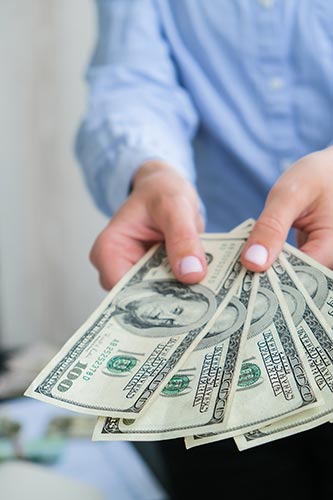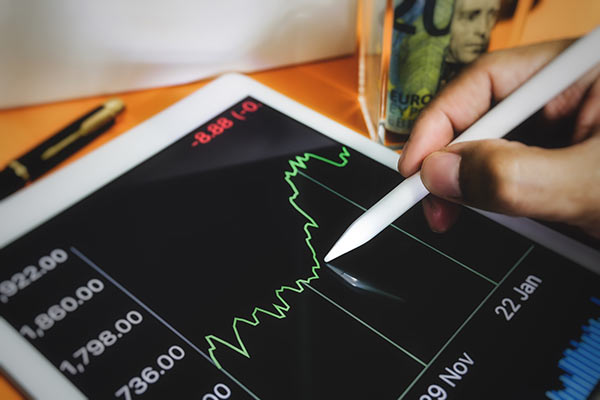
Now that you've done your tax return, you know how little things can really add up. A deduction for mortgage interest? Good. A childcare deduction? Great! The choices you make in your everyday life do more than impact your checking account. They also have an impact on the big picture of your finances.
The same is true with life insurance.
Did you know that the kind of life insurance you buy can have a big effect on how much money you have during retirement? Let me show you how.
➡️ Want to talk to a real person about the benefits of cash value life insurance? Call or email me for a personalized consultation!
Schedule a CallBuy Term...
The most popular type of life insurance is "term," a policy that covers you for a specific amount of time. If you pass away during the term, your insurer pays your family a death benefit. If you're alive at the end of your term, the policy expires. You have the option to renew, but because you're older now (and your age/health contributes greatly to the policy cost), it's going to be a lot more expensive.
So why do people choose a term policy? Because it's affordable. It provides basic coverage at a rate that won't break the bank. That's why many financial talk show hosts recommend it — you've probably heard one or more of them advise callers to "buy term and invest the difference." But what does that really mean?
➡️ Want to talk to a real person about the benefits of cash value life insurance? Call or email me for a personalized consultation!
Schedule a Call...Invest the Difference

Term life insurance is less expensive than cash value life insurance (a policy that covers you for your entire life). These lifelong policies come with a cash value account, funded with a part of each payment you make. That money earns interest and grows tax-deferred over time. Later, perhaps during retirement, you can withdraw that money via policy loans or partial withdrawals and use it for anything you like.
However, because a cash value policy costs more, you'll hear people like Dave Ramsey suggest you buy a cheaper term policy and invest the cash you saved in a mutual fund. The idea here is that your mutual fund will grow faster than your cash value. But will it?
➡️ Want to talk to a real person about the benefits of cash value life insurance? Call or email me for a personalized consultation!
Schedule a Call...and Take on Too Much Risk?
Let's say you bought a 20-year term policy and invested the difference (a few hundred bucks a month) in a mutual fund. Even if you chose a diversified fund based on the S&P 500, you're still subject to the ups-and-downs of the stock market.
Let's look at one hypothetical historic example. Say you first bought into a mutual fund in 1999. You would have had to weather two big downturns — one in 2002 and one in 2009. If you purchased the stock in early 2000, when the S&P 500 was at roughly 1,500, you would have seen a big dip in 2002, when the index lost almost half of its value and dropped below 800.
You would have had to wait until 2007 for the index to rise above 1,500 again. But then the real estate bubble burst, and the index's value dropped again. You would have had to wait until early 2013 to see the index rise over 1,500 again. Overall, that's a wait of almost 13 years just to break even.

Of course, this is a specific example in time - drastic downturns are relatively rare. But they're also unpredictable, which means you can't ever be 100% confident in your returns. It is possible for the "difference" you invested to fail to return what you expect.
| Date | S&P 500 Closing Point Value |
|---|---|
| March 22, 2000 | 1500.64 |
| October 9, 2002 | 777 |
| October 9, 2007 | 1565.15 |
| March 9, 2009 | 677 |
| January 25, 2013 | 1502.96 |
| Net Gain, 2000-2013: | 1.96 points |
And just in case you're thinking, "This won't happen to me," let me highlight a couple other ways the "invest the difference" strategy may take longer to pay off than you anticipate:
- As of October 2023, more than 25% of the stocks in the S&P 500 are lower now than they were five years ago. That means people who invested in these stocks have had their money tied up for five years without realizing any gains.^ These underperforming stocks include big-name stocks like Walt Disney (DIS) and Carnival Cruise Lines (CCL). They're referred to as "dead money" stocks. This means that even though the S&P 500 index has gained 55.2% in the past five years, you had a 1 in 4 chance of picking a stock that would earn you nothing.
- As of September 2022, stock market losses had wiped out $9 trillion in American wealth. Losses in the bond market as well as major market indexes combined to squeeze trillions out of the market in summer and early fall of 2022. And it's not just the wealthiest Americans who were affected. The bottom 50% of Americans in terms of wealth lost about $70 billion in 2022's downturn.^^
➡️ Want to talk to a real person about the benefits of cash value life insurance? Call or email me for a personalized consultation!
Schedule a CallThe Alternative: Permanent Life Insurance

On the other hand, if you'd bought a whole life insurance policy in 2000, it would have built solid cash value every year, no matter what the market did. That's an increase in value every year between 2000 and today.
The interest rates paid to cash value accounts are set the insurance company when you buy your policy. If interest rates are high, it's a good time to lock in that rate. If interest rates are low, you may be more interested in policy types that let you invest your cash value in selected options (variable universal life) or tie your interest gains to a market index (indexed universal life). It all depends on your tolerance for risk versus your need for a guaranteed result. I can through all your options with you to see which kind of policy makes more sense for you.
On average, guaranteed interest rates for whole life policies average 2-3%. Some insurers will offer even higher rates. In the example above, the original investment in the S&P 500 index earned about 1.3%. When you compare guaranteed gains with the uncertain future of the stock market, it's easy to see why a lot of my clients are opting for the secure, guaranteed gains.
➡️ Want to talk to a real person about the benefits of cash value life insurance? Call or email me for a personalized consultation!
Schedule a CallBut What about a Bull Market?

Yes, a bull market will likely create stock market gains that eclipse your slow and steady cash value growth. But here's the thing about a bull market - it doesn't last forever. There's always a downturn, even if it's 10 or 15 years after the start of the current bull market.
Plus, a steadily rising market doesn't take inflation into account. For example, let's say you invested $10,000 in the S&P 500 in 2018. By the end of 2023, you would have had $17,470.02, assuming you re-invested all your earnings. But when you adjust $17,407.02 for inflation, it had the purchasing power of just $14,259.74.** That's a loss of 18% of that money's value!
On the other hand, a cash value life insurance policy is guaranteed to offer a safe, steady return. Some insurers also offer policies that pay dividends, which you can use to buy more coverage and earn more cash value - all without adding a dime to your policy. That's a handy hedge against inflation, ensuring you're getting more for your money without costing you anything out of pocket. That's not a bad option if you want to avoid all the risks that come along with investing.
Are you interested in a secure source of supplementary retirement income? Cash value life insurance may be right for you! First and foremost, though, life insurance is about the peace of mind it offers for you and your loved ones. As you're making a decision, be sure you take this into consideration, too!
➡️ Want to talk to a real person about the benefits of cash value life insurance? Call or email me for a personalized consultation!
Schedule a Call*"Compound Annual Growth Rate (Annualized Return)," MoneyChimp.com, using S&P 500 data provided by Robert Shiller at econ.yale.edu. Reviewed October 25, 2023.
^"25% Of The S&P 500 Are 'Dead Money' Stocks You Likely Own," Investor's Business Daily, accessed October 25, 2023
^^"Stock market losses wipe out $9 trillion from Americans’ wealth," CNBC.com, accessed October 25, 2023
**"S&P 500 Data," OfficialData.org, accessed October 25, 2023
